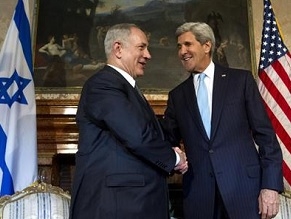|
World Jewish News

Israeli Prime Minister Benjamin Netanyahu met US Secretary of State John Kerry in Rome on Wednesday.
|
Netanyahu in meeting with Kerry in Rome: it would be a tragic mistake to stop sanctions against Iran
24.10.2013, Israel and the World Israeli Prime Minister Benjamin Netanyahu said it would be a tragic mistake to stop the sanctions against Iran before the dismantling of the Iranian nuclear programme.
‘’The leadership of the United States and the President have shown on the issue of sanctions I think has been centrally important. I think it'll be a tragic mistake to stop right before that goal is realized,’’ he said in Rome on Wednesday in a press statement with US Secretary of State John Kerry before they met for seven hours to discuss Iran and Israel’s peace process with the Palestinians, as well the situation in Syria and bilateral issues.
“I think it would be a tragic mistake to stop right before that goal is realized, and I look forward to discussing this issue, obviously, with you,’’ he added.
"The foremost security problem that we face as you said is Iran's quest for nuclear weapons. Preventing that is a goal I share with you and President Obama, and you have said, I think wisely, that Iran must not have a nuclear weapons capability, which means that they shouldn't have centrifuges or enrichment. They shouldn't have a plutonium heavy water plant, which is used only for nuclear weapons. They should get rid of the advanced fissile material and they shouldn't have underground nuclear facilities, underground for one reason – for military purposes,’’ Netanyahu said statement.
He said ‘’a partial deal that leaves Iran with these capabilities is a bad deal.’
He continued,“You wisely insisted there wouldn’t be a partial deal with Syria,” Netanyahu said. “You were right. If (Syrian President Bashar) Assad had said, ‘I’d like to keep 20 percent, 50 percent, or 80 percent of my chemical weapons capability,’ you would have refused — and correctly so.”
Earlier, in a meeting with Italian Prime Minister Enrico Letta, insisted that “many nations in Europe, North America, and Asia have nuclear energy without centrifuges or plutonium. The only reason Iran is demanding centrifuges and plutonium is to enable it to produce enough materials for a nuclear bomb. This is why the UN Security Council reached many resolutions, including one in 2010 that called for Iran to destroy the centrifuges and cease the production of plutonium.”
“If Iran retains these capabilities, it will be able to progress quickly toward the production of a bomb,” the prime minister continued. “It can move quickly from a low level of 3.5% enrichment straight to 90% without the intermediate level of 20%. We cannot let them do this. Our efforts toward peace can be severely harmed if Iran succeeds in it goals.”
In his statement, Kerry said that “no deal is better than a bad deal.” But, he added, “if this can be solved satisfactorily, diplomatically, it is clearly better for everyone.”
He said Iran would have to prove to the world that its nuclear programme was not military.
“We will need to know that actions are being taken, which make it clear, undeniably clear, fail-safe to the world, that whatever program is pursued is indeed a peaceful program.”
He said the US ‘’will pursue a diplomatic initiative with eyes wide open, aware it will be vital for Iran to live up to those standards other nations that have nuclear programs live up to as they prove those programs are indeed peaceful.’’
On the Israeli-Palestinian talks, the Israeli Prime Minister said ‘’peace is premised on mutual recognition, of two states for two peoples, of the Palestinian state for the Palestinian people mirrored by the Jewish state for the Jewish people.’’
‘’I think that's fundamental for any peace, but equally it must be a peace that, as President Obama has said, a peace that Israel can defend by itself, for itself, against any conceivable threat. I think these are the two twin pillars for peace and I look forward to discussing how we can advance both goals in our discussions today and undoubtedly our discussions tomorrow as well."
EJP
|
|
